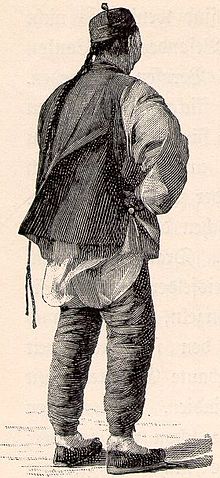Pigtail
The Chinese braid ( Chinese 辮子 / 辫子 , Pinyin biànzi , Manchurian : soncoho ) was the typical hairstyle of men in China from the 17th century to the beginning of the 20th century . The forehead hair was shaved regularly and the rest of the hair was worn long and often in a braid. This hairstyle was imposed on the conquered Chinese by the Manchu rulers and fell out of use at the end of the imperial era .
history
This hairstyle was introduced at the beginning of the Qing Dynasty . A law passed by the regent Dorgon in 1645 ordered that every Chinese should wear a braid under penalty of death. However, it was not until after 1660 that the braid became established in Chinese society.
The Manchu rulers imposed a series of laws ( Chinese 剃髮 令 / 剃发 令 , Pinyin tīfǎlìng ) on the Chinese in the 17th century , with which this hairstyle was enforced. Traditionally, the adult Han Chinese did not have their hair cut, as this would have contradicted the child patience taught by Confucius , according to which the body, hair and skin were inherited from their parents and therefore should not be damaged:
- 身体 发 肤 , 受 之 父母 , 不敢 毁伤 , 孝 至 始 也。
root cause
The typical Manchurian braid was imposed on the Han Chinese men, on the one hand to demonstrate submission to the rule of the Qing and on the other hand to make it impossible to distinguish them visually from the Manchu. Over the centuries it has become a matter of course for the Chinese that men wear pigtails, and it has even been perceived as elegant and sophisticated. It was only when the Qing state crisis arose in the 19th century that the Qing government was increasingly stylized as Manchurian rule and the braid was seen by Han Chinese nationalists as a symbol of oppression. One of the first measures of the 1911 revolution was to do away with braids.
One of General Yuan Shikai's most important followers was General Zhang Xun, who was nicknamed "Braid General" because he had kept his braid even during the Republic of China out of loyalty to the Qing Dynasty .
In Lu Xun's True Story of AQ it says:
- “ When the night watchman Zhao came down the street without anything dangling from his head, the peasants shouted, 'Ah, here comes a revolutionary! '“
Singapore was of great importance as a stopover for the Chinese who traveled to Europe by ship. Reports from the 19th century describe how Chinese students cut off their braids on their way to Europe in Singapore and bought a false braid ( Chinese 辮 連 子 , Pinyin biànliánzi ) made of black silk on their return on a stopover .
description

Albert Henry Rasmussen and Willi Rickmer Rickmers write in their China report " When the braids fell ":
- The average coolie, boatman, or farmer was an accessible fellow. These people were morally pure and healthy. I watched them with pleasure in the barber's chairs on the bank, where they shaved off their hair around their braids. The braid was in the middle of the skull, everything else had to be shaved daily. Only in mourning did this not happen for a while. The daily break from shaving, associated with muscle kneading and ear piercing, evidently produced comfort and satisfaction. It also proved that these people had regular jobs and could afford incredibly cheap pleasure. The rest of the body seldom came into contact with soap and water. Still, they looked good when they got up and walked tight with the well-tended braid, the end of which was adorned with a black silk tassel.
- Nice black silk ankle bands looped around the ends of the bloomers. I found it strange that the Chinese should give so much to the braid and ankle band that had originally been forced upon them by the conquering Manchus as a sign of submission. In the course of time, such symbols often acquire the opposite meaning and one is proud of them.
Idioms
- 盤 辮子 / 盘 辫子 , pánbiànzi - "wrap the braid around the head"
- 柈 辮子 / 柈 辫子 , pánbiànzi - "wrap the braid around the head"
- 䯰 , jiè - "use a hairpin to style the hair"
- 抓辮子 / 抓辫子 , zhuābiànzi - "taking advantage of someone's mistake"
- 割 辮 / 割 辫 , gēbiàn - "cut off the braid"
- 繚 辮 / 缭 辫 , liáobiàn - “to wind the braid around the head; tie the braid at the bottom "
literature
- Albert Henry Rasmussen, Willi Rickmer Rickmers: When the braids fell . Brockhaus, 1956.
